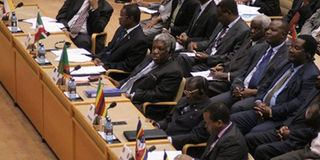Ethiopia on the spot over trade barriers

Head of states at a past Comesa meeting. The organisation wants the trade wrangle between Kenya and Ethiopia resolved as soon as possible. File
A delegation is meeting in Nairobi to woo Ethiopia to tone down its restrictive trade practices, which have lately attracted uproar from the Common Market for Eastern and Southern Africa (Comesa) member states.
Participants from Kenya, Ethiopia and Comesa secretariat are to come up with a list of products that will be traded duty-free at the two countries’ border points under the simplified trade regime.
“Small cross-border traders expect our governments to minimise the paperwork and amount of time they spend at the borders,” the Trade permanent secretary, Mr Abdulrazaq Ali, said Thursday.
“The challenge is further compounded by lack of harmonised procedures for processing transactions across the countries.”
Mr Ali, speaking at the two-day meeting, said a simplified trade regime will reduce time taken to cross borders, as governments succeed in boosting market access. He added that under the Comesa cross-border trade reform programme, Kenya is finalising implementation of the simplified trade regime at the Kenya/Uganda, Kenya/Sudan and Kenya/Tanzania borders.
Ethiopia, though a member of Comesa, has in the past found itself in conflict with other member countries over restrictions to its markets.
Last year, it introduced price controls on about 20 essential commodities, a move that triggered protests among Comesa partners such as Kenya.
Angered by the move, Kenya raised urged the Comesa secretariat to mediate in a dispute over a list of products legible under a special cross-border trading scheme.
However, Thursday, Mr Fikru Tadesse Teferi, the head of Ethiopia delegation, defended his country, saying, trade between the two countries has been on the rise.
“Trade is in favour of Kenya,” said Mr Fikru, adding that Ethiopian imports on average products worth about Sh2.7 billion per year, while its exports to Kenya are worth about Sh270 million.



